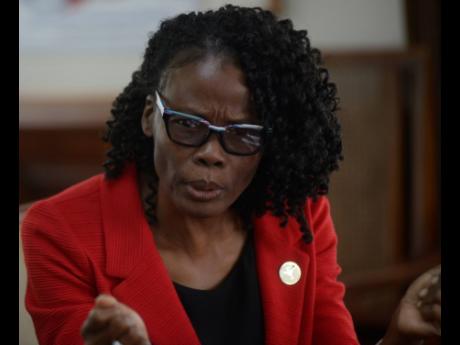‘Tipping point’
Sickouts, absenteeism plague hospitals for second day
High levels of absenteeism among Jamaica’s nurses are increasingly a cause for concern for hospital administrators battling an unprecedented public-health emergency. That revelation by a senior nursing official on Thursday gave broader insight...
High levels of absenteeism among Jamaica’s nurses are increasingly a cause for concern for hospital administrators battling an unprecedented public-health emergency.
That revelation by a senior nursing official on Thursday gave broader insight into the agitation from nurses, which dragged into a second day, maintaining pressure on the Holness administration to yield to militant appeals for an improvement in remuneration and working conditions.
Those calls coincide with ballooning COVID-19 infections across the country, with hospitalisations hitting an all-time high of 705 as officials scramble to find makeshift accommodations.
Some hospitals reported few or no nurses calling in sick or not turning up for duty Thursday, but others, like Princess Margaret in St Thomas, were still affected. Of 37 workers spanning administration, registered nurses, patient care assistants, and others, 24 reported to work, an official revealed.
Nationally, about one-third of nurses reported sick or were absent for the 7 a.m.-3 p.m. shift on Thursday, Health and Wellness Minister Dr Christopher Tufton said. However, the turnout improved for the evening shift, with 764, or 79 per cent, of the 973 nurses across all four regional health authorities reporting for duty.
Jamaica’s public healthcare infrastructure has for decades laboured under the weight of sweatshop shifts and inadequate medical supplies, with uncompetitive wages sapping drive and fuelling rapid-fire attrition overseas.
But Carmen Johnson, immediate past president of the NAJ, is warning the Government that nurses appear to be at a “tipping point”.
“For the last couple of months, absenteeism has become a frustrating issue because it is the same nurses that we are recycling to cover the units. Now, we are saying to them work on and do sessions to ensure that we have coverage, so we are at a point of burnout,” Johnson told The Gleaner on Thursday.
Burnout complaints are not new to the healthcare sector, but the pressure exerted by the coronavirus caseload has caused even higher levels of fatigue.
The country inched towards 64,300 infections on Wednesday, with deaths mounting to 1,453. Eighty-four patients are severely ill while 58 are critical.
But with a seven-day average positivity rate of 43.5 per cent, hospitalisations are not expected to ease immediately as the country prepares to enter a second three-day lockdown on Sunday.
Johnson said that chronic exhaustion had begun to set in, with spiralling prices exacerbating cost-of-living concerns.
She disclosed that some nurses are forced to spend up to $4,000 to travel to and from work in a day.
“They can’t afford to drive. Taxi fare has gone up; they have to pay to come, and when they leave – even though we may get a travel allowance – it cannot pay the fare,” she said.
To mitigate the absences, new graduate nurses, nurse administrators and managers have had to intervene to provide cover for essential areas.
Carmen Brissett, director of the Mental Health Programme at the University Hospital of the West Indies, disclosed on Thursday that some nurses had been calling in sick, forcing the redeployment of staff.
Nurses have had to work up to 16-hour shifts.
“Everywhere is short, and we have to look after the patients,” Brissett told The Gleaner.
Brissett, who is also vice-president of the NAJ, believes that a prolonged sickout could undercut the bargaining strength of the union in ongoing salary negotiations. The protest action was evidence of a deepening schism between junior and senior nurses.
“I don’t know that they will continue because … they have to come back to work at a point, and as pointed out, the Government will not negotiate with us if we are out there sick,” Brissett said.
“This can destabilise our membership because they still have the feeling that NAJ is not doing what they want them to do … ,” said the former president.
NAJ President Patsy Edwards Henry pleaded with the disgruntled members to return to work in a press statement at the end of the first day of protest. Calls to her cell phone on Thursday went unanswered.
Weighing in on the sickout, Johnson expressed concern that the divide in the membership could widen.
“What we wouldn’t want is to have a separation where people decide that, ‘OK, since they are not paying us any mind, let us separate and do what we want to do,’” she said.

